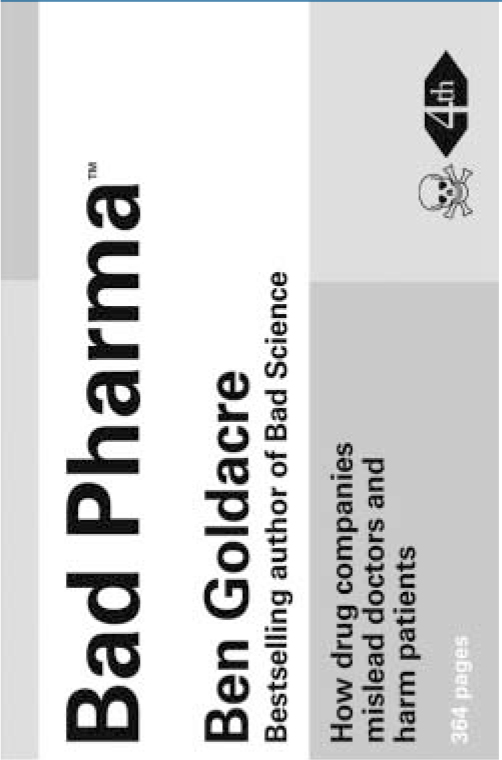
Bad Pharma isn't funny - unlike the much praised predecessor, Bad Science. Goldacre's style is as sharp and entertaining as ever, but his tone is more sombre, concerned with the contamination of our evidence base and the harmful consequences for our patients. This is not just about the much discussed shortcomings of Big Pharma alone - regulators, journal editors, academics, doctors and patient organisations are all implicated in a failure to build a transparent, reliable, unbiased and safe knowledge framework for treatment decision-making that doctors and patients can share. His views are persuasive: he is not unearthing some ‘cartoonish evil’, but surveying instead the myriad practices that conspire to distort and tarnish clinical evidence. There are few out and out villains, as Goldacre points out - rather, there is evidence of ordinary human weakness: laziness, obstinacy, vanity, and plain perversity, often driven by banal self-interest. Just about everything in the book has been written about somewhere else - the sharp financial practice, misleading trial reporting, withholding of data, bizarre regulatory decisions, dubious marketing - but as far as I know, no one has put it all together so accessibly, or, importantly, constructively. Goldacre offers realistic solutions, every step of the way - and the Afterword outlines a modest prescription for action.
Psychiatric issues pepper the book. Goldacre is a member of the Royal College of Psychiatrists, and well placed to consider such things as the selective reporting of antidepressant trials, deliberately misleading antipsychotic comparisons, and the invention and extension of disease categories for marketing exploitation. A benign side-effect of this book is that it outlines some of the core skills doctors need to help manage information for patients (and themselves). Chapter 1, for example, in addition to showing the impact of withholding unflattering trial data, gives a gentle and concise introduction to systematic review and meta-analysis for the uninitiated; and chapter 4 is almost a training manual for spotting data manipulation in clinical trials: ideal for medical students in general and psychiatrists in particular. Sadly, this sort of wisdom does not match up entirely with contemporary medical curricula around the country, having to compete as it does with modules on ‘psychogeography’, and ‘The Poetry of Thoracic Surgery - a Post-Modern Approach’. And if pharmacology had not disappeared from medical schools, doctors would be better equipped to figure some of this stuff out on their own.
Goldacre does not really critique the limitations of systematic review and meta-analysis (where the art of deception can still happily operate, and sometimes does in the political shaping of guidelines), nor does he comment on the frequency with which systematic evidence synthesis simply reveals that there was never any sound evidence in the first place.



eLetters
No eLetters have been published for this article.